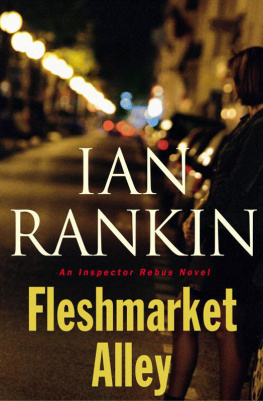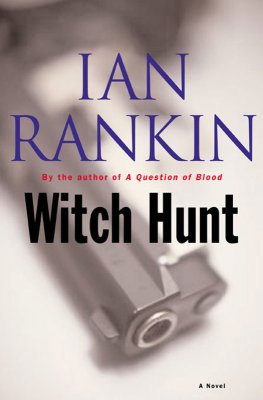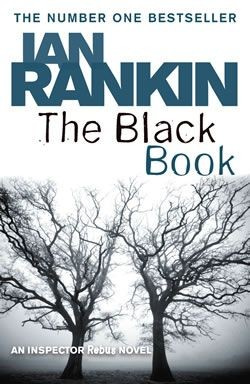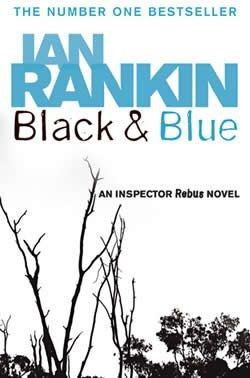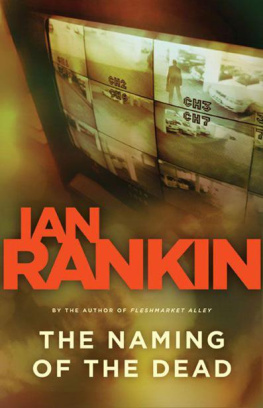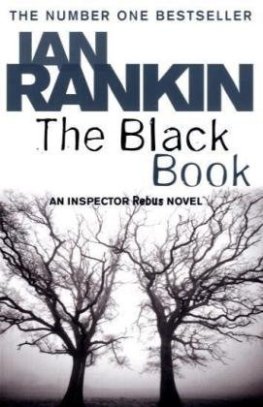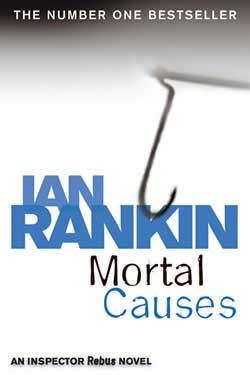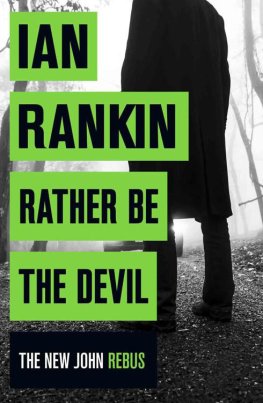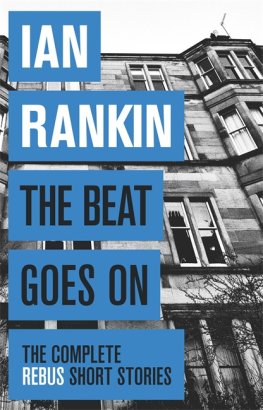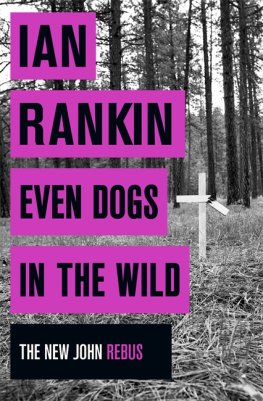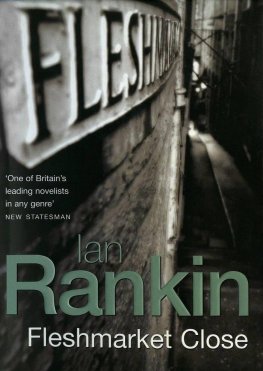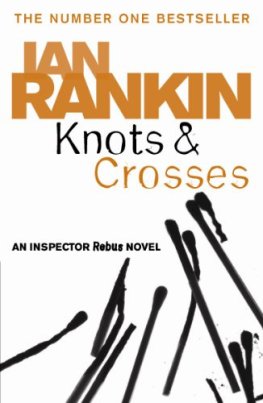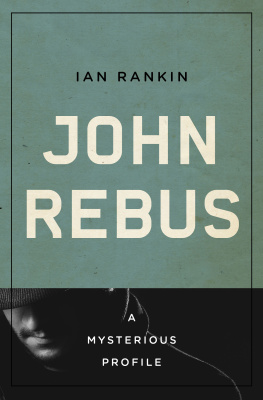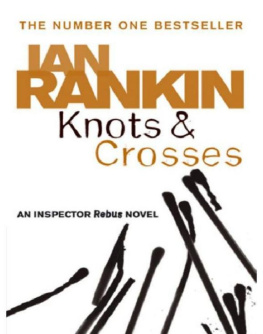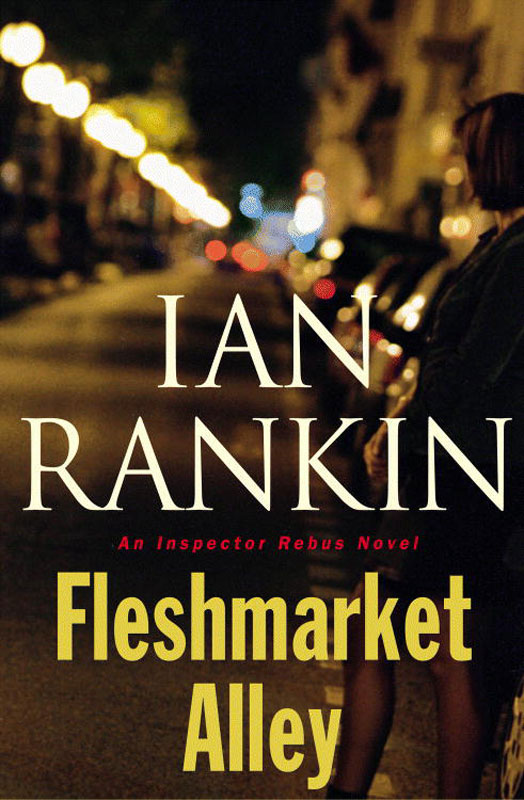Copyright 2004 by John Rebus Limited
All rights reserved. No part of this book may be reproduced in any form or by any electronic or mechanical means, including information storage and retrieval systems, without permission in writing from the publisher, except by a reviewer who may quote brief passages in a review.
Little, Brown and Company
Hachette Book Group, USA
237 Park Avenue, New York, NY 10017
Visit our Web site at www.twbookmark.com
First eBook Edition: January 2006
The characters and events in this book are fictitious. Any similarity to real persons, living or dead, is coincidental and not intended by the author.
ISBN: 978-0-7595-6703-0
ALSO BY IAN RANKIN
The Inspector Rebus Series
Knots & Crosses
Hide & Seek
Tooth & Nail
A Good Hanging and Other Stories
Strip Jack
The Black Book
Mortal Causes
Let It Bleed
Black & Blue
The Hanging Garden
Death Is Not the End (A Novella)
Dead Souls
Set in Darkness
The Falls
Resurrection Men
A Question of Blood
Other Novels
Witch Hunt
It is to Scotland that we look for our idea of civilization.
Voltaire
The climate of Edinburgh is such that the weak succumb young... and the strong envy them.
Dr. Johnson to Boswell
Monday
I m not supposed to be here, Detective Inspector John Rebus said. Not that anyone was listening. Knoxland was a housing scheme on the western edge of Edinburgh, off Rebuss patch. He was there because the West End guys were shorthanded. He was also there because his own bosses couldnt think what to do with him. It was a rainy Monday afternoon, and nothing about the day so far boded anything but ill for the rest of the working week.
Rebuss old police station, his happy hunting ground these past eight or so years, had seen itself reorganized. As a result, it no longer boasted a CID office, meaning Rebus and his fellow detectives had been cast adrift, shipped out to other stations. Hed ended up at Gayfield Square, just off Leith Walk: a cushy number, according to some. Gayfield Square was on the periphery of the elegant New Town, behind whose eighteenth- and nineteenth-century facades anything could be happening without those outside being any the wiser. It certainly felt a long way from Knoxland, farther than the three factual miles. It was another culture, another country.
Knoxland had been built in the 1960s, apparently from papier-mch and balsa wood. Walls so thin you could hear the neighbors cutting their toenails and smell their dinner on the stove. Patches of damp bloomed on its gray concrete walls. Graffiti had turned the place into Hard Knox. Other embellishments warned the Pakis to Get Out, while a scrawl that was probably only an hour or so old bore the legend One Less.
What shops there were had resorted to metal grilles on windows and doors, not even bothering to remove them during opening hours. The place itself was contained, hemmed in by divided highways to north and west. The bright-eyed developers had scooped out underpasses beneath the roads. Probably in their original drawings, these had been clean, well-lit spaces where neighbors would stop to chat about the weather and the new curtains in the window of number 42. In reality, theyd become no-go areas for everyone but the foolhardy and suicidal, even in daytime. Rebus was forever seeing reports of bag snatchings and muggings.
It was probably those same bright-eyed developers whod had the idea of naming the estates various high-rise blocks after Scottish writers, and appending each with the word House, serving merely to rub in that these were nothing like real houses.
Barrie House.
Stevenson House.
Scott House.
Burns House.
Reaching skywards with all the subtlety of single-digit salutes.
He looked around for somewhere to deposit his half-empty coffee cup. Hed stopped at a bakers on Gorgie Road, knowing that the farther from the city center he drove, the less likely he would be to find anything remotely drinkable. Not a good choice: the coffee had been scalding at first, quickly turning tepid, which only served to highlight its lack of anything resembling flavor. There were no bins nearby; no bins at all, in fact. The sidewalks and grass verges, however, were doing their best to oblige, so Rebus added his litter to the mosaic, then straightened up and pushed his hands deep into his coat pockets. He could see his breath in the air.
Papers are going to have a field day with this, someone was muttering. There were a dozen figures shuffling around in the covered walkway between two of the high-rise blocks. The place smelled faintly of urine, human or otherwise. Plenty of dogs in the vicinity, one or two even wearing collars. They would come sniffing at the entrance to the walkway, until chased off by one of the uniforms. Crime-scene tape now blocked both ends of the passage. Kids on bikes were craning their necks for a look. Police photographers were gathering evidence, vying for space with the forensic team. They were dressed in white overalls, heads covered. An anonymous gray van was parked alongside the police cars on the muddy play area outside. Its driver had complained to Rebus that some kids had demanded money from him to keep an eye on it.
Bloody sharks.
Soon, this driver would take the body to the mortuary, where the postmortem examination would take place. But already they knew they were dealing with homicide. Multiple stab wounds, including one to the throat. The trail of blood showed that the victim had been attacked ten or twelve feet farther into the passage. Hed probably tried to get away, crawling towards the light, his attacker making more lunges as he faltered and fell.
Nothing in the pockets except some loose change, another detective was saying. Lets hope someone knows who he is...
Rebus didnt know who he was, but he knew what he was: he was a case, a statistic. More than that, he was a story, and even now the citys journalists would be scenting it, for all the world like a pack sensing its quarry. Knoxland was not a popular estate. It tended to attract only the desperate and those with no choice in the matter. In the past, it had been used as a dumping ground for tenants the council found hard to house elsewhere: addicts and the unhinged. More recently, immigrants had been catapulted into its dankest, least welcoming corners. Asylum seekers, refugees. People nobody really wanted to think about or have to deal with. Looking around, Rebus realized that the poor bastards must be left feeling like mice in a maze. The difference being that in laboratories, there were few predators, while out here in the real world, they were everywhere.
They carried knives. They roamed at will. They ran the streets.
And now they had killed.
Another car drew up, a figure emerging from it. Rebus knew the face: Steve Holly, local hack for a Glasgow tabloid. Overweight and bustling, hair gelled into spikes. Before locking his car, Holly tucked his laptop under his arm, ready to bring it with him. Street-savvy, that was Steve Holly. He nodded at Rebus.
Got anything for me?
Rebus shook his head, and Holly started looking around for other more likely sources. Heard youd been kicked out of St. Leonards, he said, as if making conversation, eyes everywhere but on Rebus. Dont tell me theyve dumped you out here?
Rebus knew better than to rise to it, but Holly was beginning to enjoy himself. Dumping ground just about sums this place up. School of hard knocks, eh? Holly started to light a cigarette, and Rebus knew he was thinking of the story hed be writing later on: dreaming up punning sentences and scraps of two-penny philosophy.

